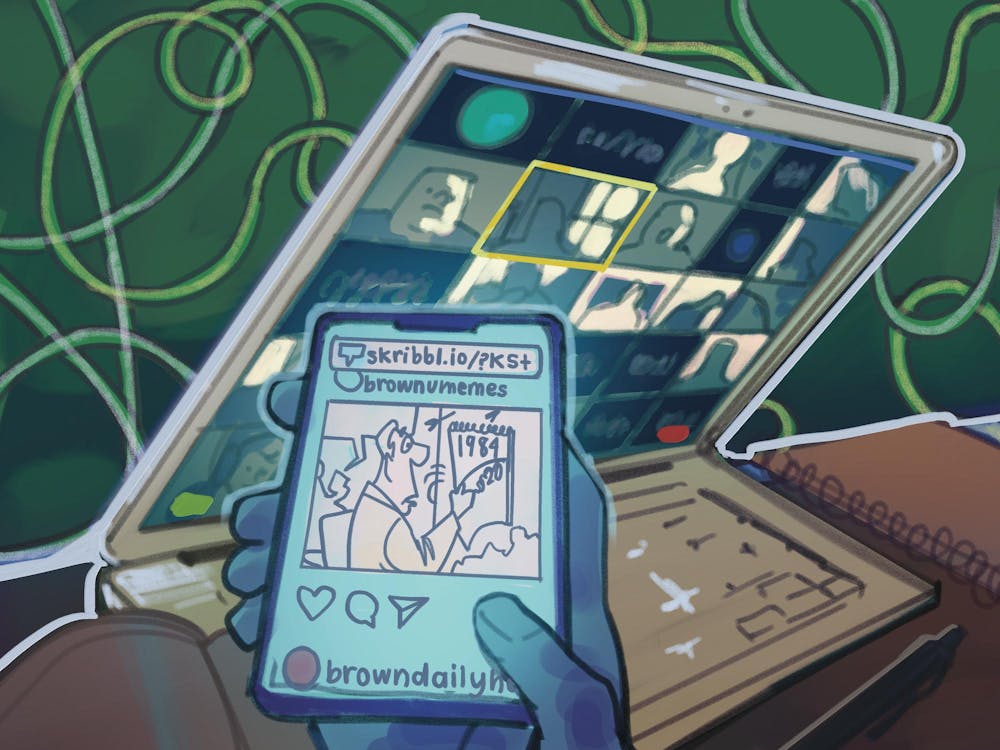Coming to Brown during lockdown was “honestly a nightmare” for Meghan Spangenberg ’24.
As graduating seniors, Spangenberg and fellow members of the class of 2024 began their time at Brown with extensive pandemic restrictions in place. But despite the difficulties they faced adjusting to college life in isolation, the class found a non-traditional way to connect: forging online communities that continue to influence their college experiences today.
For Chas Steinbrugge ’24, connecting with fellow classmates was a major concern when he started at Brown. Due to the University’s
unique trimester system at the height of the COVID-19 pandemic, a majority of the class of 2024 spent the fall 2020 semester taking a single class remotely, thus solely relegated to virtual communications as they tried to meet one another.
“It was definitely difficult to connect with classmates in the same way I would have hoped,” Steinbrugge said, noting that he was mostly exposed to fellow students from his hometown of Richmond, Virginia.
Brayson Freeman ’24 said he “felt behind” during his first year at college because all of his friends had already gone off and “started (college)” while he was still trying to figure out a way to meet his peers. “It was just hard to meet people, to connect,” he said.
In this complicated social context, digital communities emerged to fill the gap. Mina Sarmas ’24 found that social media
offered a way for people to “come together.”
“I applied to Brown because of its (values of) community collaboration,” she said. “Even through COVID-19, and all of
the challenges that came with that, people … were able to still hold those values.”
Emergence of an online community
Sarmas was at the front lines of the class of 2024’s efforts to build community. She was accepted to Brown under early decision, right before the height of the COVID-19 pandemic, and created a community-wide chat on the messaging app GroupMe.
When the University released regular decision notifications in March, around two weeks after nationwide shelter-in-place
orders began, the GroupMe chat exploded.
“A bunch of people joined it,” Sarmas said. “The online community was … vibrant. There were so many people in the group chat.” Membership in the chat swelled to over 1,600.
Isabella Lloyd ’24 suggested that the trimester system strengthened the class’s online community.
“We kind of had that weird deferred semester and then when we came onto campus there was basically no way to connect except virtually,” she said.
During that deferred semester, students used GroupeMe to organize game nights, hosting Zooms to play games like Skribbl.io or Among Us, according to both Sarmas and Steinbrugge.
Olivia Booth ’24 joined the class GroupMe “after they told us we wouldn’t be coming on campus in the fall,” she said. “I panic-joined an obscene amount of hyper-specific” chats.
Sarmas mentioned several smaller offshoots from the main GroupMe, including affinity-, geographic- and interest-based
groups.
One such chat, formed by Lloyd, brought together fans of the popular Broadway show “Hamilton” to perform a virtual cover of the song “Alexander Hamilton." “Everyone had parts and they were welcome to do what they like(d),” Lloyd said.
“We split the lyrics individually so each person had equal time and … everyone sent videos of their parts and audios of the whole song” that Lloyd then cut together.
These projects gave incoming first-years “a sense of community” and “wouldn’t have been possible without technology,” Lloyd added.
While Booth doesn’t remember how she came about the “Hamilton” project, she looks back at her participation in the video fondly. “It was like a ten-minute commitment,” she said, “and it’s funny to look back on it now and see people I’ve met in person since and see how dramatically we’ve all changed.”
As a result of connections made through GroupMe, Booth also “ended up writing a 7-episode sitcom, joining a virtual Bible study and sending a Hail Mary message to the GroupMe asking
if anybody wanted to WWOOF (World Wide Opportunities on Organic Farms) in San Diego with me for the fall,” she said.
Another student responded and, a week later, the two of them moved to a San Diego commune for a month. Booth shared that she is still close friends with her WWOOFing partner, which she can “almost exclusively thank the Class of ’24 GroupMe” for.
Beyond forming important community spaces, GroupMe also provided an opportunity for students to discuss more serious topics related to the unprecedented global events the world witnessed in 2020. But the virtual nature of these discussions sometimes led to tensions within the GroupMe.
“2020 was just a really crazy year,” Sarmas explained. “A lot of the outside events kind of came in (to the GroupMe). … Not being face-to-face, you couldn’t really see who you were talking to or know exactly what they were trying to say. Some people don’t convey things well over text.”
Rise of BrownUMemes
Despite the first impressions made by some prolific GroupMe personalities, coming to campus in January 2021 felt like a “blank slate” to many, Steinbrugge said.
But arriving on campus didn’t end the class of 2024’s sense of isolation. Sarmas said that the first-year class was “pretty isolated in terms of on-campus social life because we were in pods — you weren’t supposed to be with more than four other people including yourself.”
The GroupMe remained a way to counteract this separation, according to Sarmas. During the spring semester, she also hosted virtual first-year socials and online trivia nights over Zoom in her role as the Undergraduate Council of Students’ first-year representative.
Others turned to more comedic forums to build community. Steinbrugge had created the popular Instagram page BrownUMemes the summer before the class of 2024’s arrival on campus.
During the college application process, Steinbrugge recalled looking at colleges’ meme pages and Barstool accounts “to see what students were posting and what campus life looks like,” he said.
“I noticed that there wasn’t an account for Brown,” he said, and thus decided to create BrownUMemes to poke fun at students’ shared experiences navigating college during the
pandemic.
Steinbrugge originally geared BrownUMemes toward the class of 2024. But upon his arrival on campus, he found that much of his content applied to other class years.
“When people are here in person, all experiencing the same dining halls, (restrictions to) only takeaway food (and) different policies that were affecting everyone simultaneously, it just led to a lot more content that I was able to make jokes about,” Steinbrugge said.
While offering students entertainment, BrownUMemes also became a forum for campus discourse regarding the University’s shifting COVID-19 policies. “Whenever I would make a meme that had to do with some sort of COVID-19 policy, (it) would obviously have strong feedback from either side,” Steinbrugge said, noting that there was “a good balance of agreement and occasional criticism in the comments.”
Sarmas also worked to address University policies that may have been confusing to newcomers through an Instagram account called “First Years at Brown,” where she would post resource guides for other freshmen about campus and administrative information.
Campus shifts to Sidechat
Steinbrugge stopped posting to the BrownUMemes account in April 2023, citing the “limited possibilities for growth of the account, as well as the amount of time it took to run it.”
Dear Blueno, an anonymous Facebook page board for University community members that was popular during the class of 2024’s initial arrival on campus, similarly saw a decline in engagement and was eventually unpublished by Facebook. It was later replaced by a standalone website.
While Steinbrugge felt that his meme page once filled a “comedy void on campus,” he believes that other organizations now occupy that role. “It seems like people like getting comedy content from Sidechat and the Noser,” he said.
While Dear Blueno felt safer than Sidechat for Sarmas because moderators would review each submission before posting it online, she said that “more people engage with Sidechat (now) … because it’s anonymous” and lacks similarly rigorous regulations. A message board that allows students to instantly post their opinions, Sidechat has received attention from University community members for its content moderation policies.
Steinbrugge said that Sidechat’s anonymous nature is a “negative” because it encourages students to post more aggressive opinions, making the platform a “polarizing factor on campus.”
Looking back at lockdown
Today, Freeman said that Brown feels more like “how college is supposed to be,” and he doesn’t find himself relying on technology to connect with peers as much as he did during COVID-19. Still, he and many other members of the class of 2024 continue to view their lockdown experiences as opportunities for bonding.
“We experienced one of the most unique starts to college, and we will always be bonded because of that,” Spangenberg said. “We can all relate and sympathize with each other.”
Mathilda Silbiger ’24, who met many of her first friends at Brown through online classes, Instagram and an international WhatsApp group, said that “the ways we met one another were unconventional, for sure, but this also fostered an openness unlike that of any other class I’ve seen here.”
“I know my friends at Brown will be my friends for life,” she added.
Lloyd noted, however, that there’s currently “no generation of students left (on campus) that knew what it was like before the pandemic, so there’s probably bits of culture that were lost.”
Freeman similarly regretted that there are “some rituals” and “traditions” he missed out on due to COVID-19.
Spangenberg echoed the sentiment. “In all honesty, I think every university class of 2024 deserves an extra special senior spring and commencement this year,” he said. “It makes me sad that people in administration have forgotten what our class went through.”
Silbiger, who was a Bruno Leader this year, said her experience with “real, in-person ‘orientation’ for the first time” made her wonder “what it would have been like for our year to experience a real ice cream social, first-year dance and so on.”
Still, she emphasized that she would “never wish for a different dynamic within our class.”
While Booth said that “it’s hard to gauge the impact of COVID internet culture on our college experience because we have no basis of comparison,” she is confident that she “wouldn’t have worked on these funky projects” otherwise.
“I am super grateful for a ton of people I met through these niche-themed online groups that I’m still good friends with,” she said.
Jack Tajmajer was a Metro editor at The Herald.

Tom Li is the editor-in-chief and president of The Herald's 135th editorial board. He is from Pleasanton, California and studies economics and international and public affairs. He previously served as a metro editor, covering the Health & Environment and Development & Infrastructure beats, and has worked on The Herald's copy editing, editorial page board, design and podcast teams.





